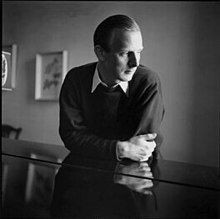|
John Addison
John Mervyn Addison (16 March 1920 – 7 December 1998) was a British composer best known for his film scores.[1] Early lifeAddison was born in Chobham, Surrey[2] to a father who was a colonel in the Royal Field Artillery, and this influenced the decision to send him to school at Wellington College, Berkshire. His grandfather was Lieut-Colonel George Addison, who played for the Royal Engineers in the 1872 and 1874 FA Cup Finals. At the age of sixteen he entered the Royal College of Music,[3] where he studied composition with Gordon Jacob, oboe with Léon Goossens, and clarinet with Frederick Thurston.[2] This education ended in 1939 with service in World War II. Addison served with the British XXX Corps in the 23rd Hussars. He was a tank officer in the Battle of Normandy and wounded at Caen, later participating in Operation Market Garden. Addison would later write the score for the film A Bridge Too Far about the operation. At the end of the war, he returned to London to teach composition at the Royal College of Music. CareerAddison is best known for his film scores. He won an Academy Award for Best Original Score and a Grammy Award in the Best Original Score from a Motion Picture or Television Show category for the music to the 1963 film, Tom Jones.[3] He also won a BAFTA Award for A Bridge Too Far (1977). His other film scores included A Taste of Honey (1961), Smashing Time (1967), The Honey Pot (1967),[4] Sleuth (1972), Swashbuckler (1976) and the television series Centennial (1978). He composed the theme music for the television series Murder, She Wrote, and won an Emmy for the 2-hour pilot episode in the Outstanding Achievement in Music Composition for a Series (dramatic underscore) category. Addison will also be remembered as the composer Alfred Hitchcock turned to when the director ended his long relationship with Bernard Herrmann over the score to his 1966 film Torn Curtain,[3] although Addison was not hired for any of his other films. He had a personal connection to Reach for the Sky (1956) which he scored, since Douglas Bader (the subject of the movie) was his brother-in-law, having married Addison's elder sister Thelma.[5] For the theatre, Addison wrote the music for John Osborne's plays The Entertainer (1957)[6] and Luther (1961).[7] He collaborated with John Cranko on a revue, "Cranks" in 1956.[8] Although he wrote numerous classical compositions, Addison explained that "If you find you're good at something, as I was as a film composer, it's stupid to do anything else." His classical works included the Concerto for trumpet, strings and percussion (1949), described by The Times as "buoyant" and "Gershwinesque";[9] a trio for oboe, clarinet and bassoon;[10] Carte Blanche, a ballet for Sadler's Wells first performed at the 1953 Edinburgh Festival[11] from which an orchestral suite of "sophisticated high spirits" was performed at the Proms;[12] a septet for wind and harp,[13] a piano concertino,[14][15] a concertante for oboe, clarinet, horn and orchestra;[16] and a partita for strings, which was warmly praised.[17] The Bassoon Concertino was one of his last compositions. It was premiered by Graham Salvage and the Hallé Orchestra on 4 July 1998 at the BBC Proms.[18] Marlene Dietrich recorded If He Swing By the String and Such Trying Times from the music in Tom Jones. Addison's collection of correspondence, scores, and studio recordings were donated to the Film Music Archives at Brigham Young University in 1994. He was survived by his wife Pamela; two sons Jonathan and Daniel; daughter Lucinda; stepson Rex Birchenough, and stepdaughter Sandra Stapleton. His daughter Jane pre-deceased him. Film scores
Music composed for TV
Concert works
Notes
ReferencesExternal links |
||||||||||||||||
